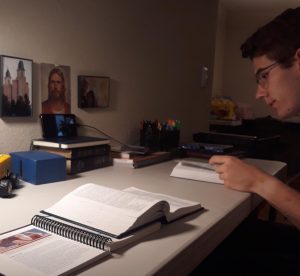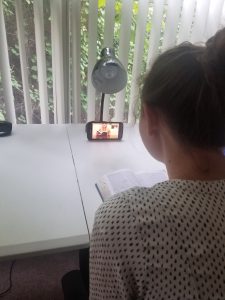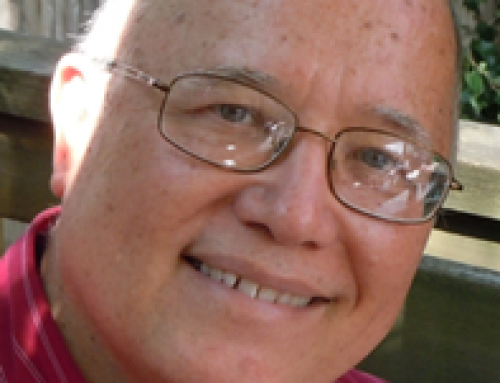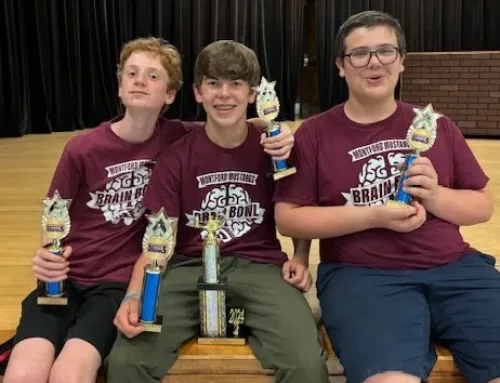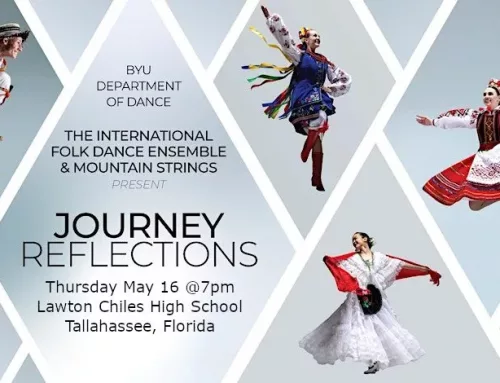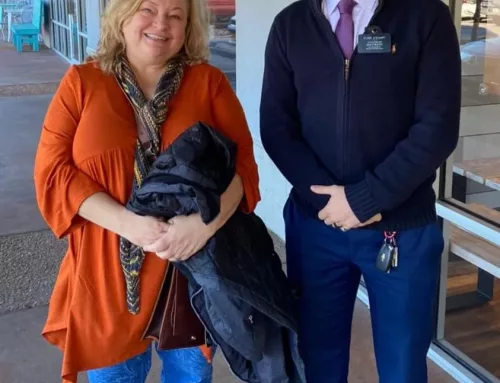Estimated reading time: 5 minutes
Latter-day Saints missionaries use social media to spread the gospel
TALLAHASSEE – These days, it is all about adaptation. As every aspect of our lives has been touched by COVID-19, from grocery buying to religious observance, two things have been at work—creativity and technology. This effective combination has enabled people of all faiths to continue to “have church” by teaching and learning via social media.
Missionaries for The Church of Jesus Christ of Latter-day Saints are using technology to good effect. Elders Preston Swensen and Noah Stevens are two young men serving in the Tallahassee Stake of The Church of Jesus Christ of Latter-day Saints, which includes congregations in Tallahassee, Thomasville, Cairo, Quincy, Crawfordville, Perry, and Madison.
Swenson is from Rupert, Idaho and Stevens is from Ephraim, Utah.
Not able to go out and meet with people in person—for safety, missionaries are under strict stay-at-home orders—they make many contacts by phone.
“We try to reach out through phone calls to people who have expressed an interest in discussing the gospel of Jesus Christ,” said Elder Swensen. “We also use video apps like Zoom to connect with people we teach.”
Both elders said that social media and video apps have been excellent tools during the quarantine. And creating a dedicated Facebook page has generated even more positive results.
“The Facebook page is a spiritual uplift and edification page,” Stevens said. “We’re posting often and building a foundation of different kinds of posts. It’s a really awesome segue to introducing the missionaries to those who want to learn about Christ.”
Posts frequently include videos, he said. A recent one depicted missionaries making cinnamon rolls and relating the process to the meaning of Easter.
“The videos have really opened the door for a lot of missionaries to contribute their talents and capitalize on technology to reach people,” he added.
The Facebook page at www.facebook.com/churchofjesuschristtally is open to the public—so anyone can join, participate, and share with their friends.
“Our hope is that we’ll have good interaction and involvement with the Facebook page,” Swensen said. “Someone can post a favorite quote, for example, and that will be shared. As we continue to be consistent and creative, we hope we’ll get a wider array of uplifting gospel messages.”
In addition to the phone calls, video chats, and Facebook page, the missionaries are offering family history and scripture study classes online. Their eventual goal is to meet interested learners face-to-face, but until then, they all get acquainted and share thoughts through social media.
“We’re offering a family history class for people who want to experience genealogy and scripture study classes for people who want to increase their knowledge,” Stevens said. “You come closer to Jesus Christ by action, and the classes are an action component.”
According to Swensen, the online classes are highly personalized. Flexibility is the hallmark, with classes suited to each person’s time, needs, and preferences.
“If you have 15 minutes or an hour, we can help,” he said. “Using the Family Search app for genealogy, we’ll help you set up a profile, do indexing, whatever. In scripture study, we can lead a discussion from the Come Follow Me program or jump around by topic … whatever people want.”
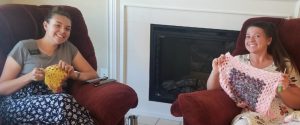
CROCHET SERVICE – Missionaries McKenna Miccolis, left, and Emily Stevens crocheting for NICU children.
Two young women missionaries in the Tallahassee Stake, Sister Emily Stevens, and Sister McKenna Miccolis, also reported having significant e-success, sending uplifting text messages, and connecting through video chat apps. Beyond that, they have found other effective ways to serve under quarantine.
Stevens is from Elk Ridge, Utah and Miccolis is from San Tan Valley, Arizona.
“We’ve been making baby blankets for the local hospital,” Miccolis said, explaining that another area missionary, Sister Calee Toomey, taught them to crochet. She, in turn, had learned from a local Baptist church group. “The blankets are about two feet square, and they’re for babies in the NICU (neonatal intensive care unit). We’re crocheting and stockpiling them until they can be delivered.”
The young women also make treats for their neighbors and drop them off with inspirational quotes.
“We do the ‘doorbell ditch,’” Stevens explained with a laugh. “We deliver treats to the porches, ring the bell, and dash.”
“We do the same thing with copies of the Bible or Book of Mormon,” Miccolis added.
Both noted that the quarantine has brought some interesting facts to light, perhaps changing the way everyone does business. Including mission-minded churches.
“You can text and call way more people in an hour than you can meet going house to house,” Stevens pointed out. “So personal experience tells us social media is very effective.”
Miccolis agreed, pointing out that, while the electronic approach works especially well with the upcoming generation—whose comfort with technology is a given—it is also embraced by people of all ages.
“What we’re experiencing may change the way we do missionary and family history work in the future,” she said. “Believe it or not, this is how the Lord is hastening His work.”
###


